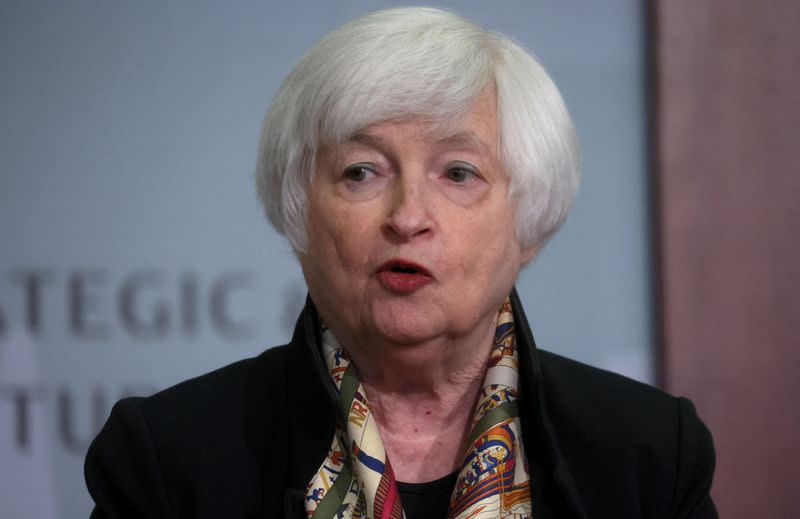Yellen wants G7 'wall of opposition' to China's excess industrial capacity

By David Lawder
STRESA, Italy (Reuters) -U.S. Treasury Secretary Janet Yellen said on Thursday that she wants market-driven countries to present a "wall of opposition" to China over its state-driven industrial policies, a key issue she is pushing at a G7 finance meeting this week.
Yellen also told a news conference that she is looking for "general agreement on the concept" from G7 finance ministers and central bank governors on a plan to bring forward the earnings from some $300 billion in frozen Russian assets that could provide Ukraine with significant financial support beyond 2025.
The two topics are expected to dominate a finance ministers and central bank governors meeting in northern Italy on Friday and Saturday.
Yellen said that many countries beyond the G7 advanced industrial democracies were concerned about China's overinvestment in electric vehicles, solar products, semiconductors, steel and other strategic industries, including Mexico, India and South Africa.
Without changes in Chinese policy, including a shift from increasing production to boosting domestic demand, Yellen said market driven economies face a flood of cheap exports from China that will threaten the viability of their manufacturers.
She said she was not asking countries to mirror U.S. tariffs or closely coordinate their trade policy responses.
"But we need to stand together and send a unified message to China," Yellen said. "So they understand it's not just one country that feels this way, but that they face a wall of opposition to the strategy that they're pursuing."
She said the G7 officials would discuss their responses and concerns that they are presenting to Beijing.
Yellen's call for G7 unity on China comes just after the Biden administration announced steep new tariffs on Chinese EVs, batteries, solar panels and other products in a bid to protect U.S. investments to develop these industries at home. Some of these higher duties will start on Aug. 1
Yellen called this week for the U.S. and Europe to respond to China's overinvestment in electric vehicles, solar products, semiconductors, steel and other key sectors in a "strategic and united way" to keep manufacturers viable on both sides of the Atlantic.
RUSSIAN ASSETS PLAN
Yellen said that if G7 ministers can agree on a concept for bringing forward the earnings on the frozen Russian assets, they will spend the time before a G7 leaders summit in Puglia in mid-June on refining the details. Other participants also said it was unlikely that details of such a loan would not be determined this week.
Yellen added that while a figure of $50 billion has been discussed, there have been no decisions on the size of a potential loan to Ukraine that would be backed by earnings of around $3.5 billion.
"This is an assured source of financing and it's important that Russia realise that we will not be deterred from supporting Ukraine for lack of resources," Yellen said.
The funding could sustain Ukraine beyond 2025, as Ukraine now has a $60 billion U.S. package of aid and about $50 billion from the EU. G7 finance ministers and central bank governors are due to meet with Ukranian Finance Minister Serhiy Marchenko on Saturday.
WEALTH TAX DENIAL
Yellen said she could not support Brazil's proposal to levy a global wealth tax on the super-rich to help fund developing countries' clean energy transitions because of its redistributive effects, dealing a setback to Brazil's G20 agenda this year.
Brazil's plan would see about 3,000 people globally who have at least $1 billion in assets pay at least the equivalent of 2% of their wealth in income tax each year.
The plan, aimed at raising $250 billion per year to help fight climate change in poorer countries, has won the endorsement of French Finance Minister Bruno Le Maire who has cited the success of a global corporate tax deal.
Yellen said she has no objections to higher taxation of the ultra-wealthy, citing President Joe Biden's proposal to tax the unrealized gains of Americans with wealth above $100 million. But she said she does not support negotiations that would involve redistributing proceeds among countries.
Brazil's proposal points up the need for more resources for climate change, Yellen said, but added: "I don't favor this particular formulation of how to go about doing that."
(Reporting by David LawderEditing by Keith Weir)


